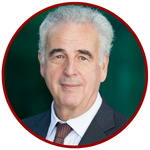Global Pandemic Prevention, Preparedness and Response: Negotiating the Future
Event description
The USC Institute on Inequalities in Global Health invites you to join us for "Global Pandemic Prevention, Preparedness and Response: Negotiating the Future" on Wednesday, Feb. 8, 9–10 a.m. PST.
COVID-19 exposed the fundamental weaknesses in pandemic preparedness and response at national and global levels in unprecedented ways. Recognizing this, the Independent Panel for Pandemic Preparedness and Response, established by the WHO Director-General, was established to conduct an independent, comprehensive review on insights and lessons learned from the health response to COVID-19, as well as previous health emergencies, and provide a fresh assessment of approaches to the challenges ahead. The World Health Assembly, the decision-making body of the World Health Organization, then established the Intergovernmental Negotiating Body to draft and negotiate a new legally binding WHO convention, agreement or other international instrument on pandemic prevention, preparedness and response (INB) for Member States to work together to strengthen the world’s structures and systems.
This one-hour virtual event will bring together key players engaged in these negotiations to discuss crucial issues in achieving a globally coordinated and effective instrument on pandemic prevention, preparedness and response. The panel will explore the history, purpose, content and current state of play concerning the pandemic agreement, with special attention to addressing inequalities, and the legal, structural and political issues to be addressed moving forward.
The dialogue will be moderated by Professor Sofia Gruskin, Director, USC Institute on Inequalities in Global Health.
Speakers:

Precious Matsoso is currently the Co-chair of the Intergovernmental Negotiating Body to Draft and Negotiate a WHO Convention, agreement or other international instrument on pandemic prevention, preparedness, and response (INB), and was a member of the Independent Panel for Pandemic Preparedness and Response. She is the former Director-General of the South African National Department of Health. She was the World Health Organization Director of Public Health Innovation and Intellectual Property. Prior to that, she served as WHO Director, Department of Technical Cooperation for Essential Drugs and Traditional Medicines. She was the Registrar of the Medicines Control Council for six years. She has served on various advisory bodies both nationally and internationally and was Chair of the WHO Executive Board. She served as a member of the UN High-Level Panel on Access to Health Technologies, Chairperson of the Independent Oversight and Advisory Committee for the WHO Health Emergencies Programme. She was the member of the Lancet Global Health Commission on High Quality Health Systems. She was the Co-Chair of WHO Digital Health Advisory Group. She is the Director of the Health Regulatory Science Platform, a division of the Wits Health Consortium and an Honorary Lecturer in the Department of Pharmacy and Pharmacology, University of the Witwatersrand.

Michel Kazatchkine has over 35 years of experience in global health as a leading physician, researcher, administrator, advocate, policymaker and diplomat, and has played key roles in various organizations, including serving as Director of the national Agency for Research on AIDS in France and French ambassador on HIV/AIDS and communicable diseases. Professor Kazatchkine served as a member on The Independent Panel for Pandemic Preparedness and Response, established by the WHO Director-General to provide an evidence-based path for the future, grounded in lessons of the present and past to ensure countries and global institutions — including, specifically, WHO — effectively address health threats. In 2007, Professor Kazatchkine was elected Executive Director of the Global Fund to fight AIDS, Tuberculosis and Malaria, a position in which he served until March 2012. Between 2012 and 2017, Professor Kazatchkine served as the UN Secretary-General’s Special Envoy on HIV/AIDS in Eastern Europe and Central Asia. Since 2018, he is the Special Advisor to the Joint UN Programme on HIV/AIDS (UNAIDS) for Eastern Europe and Central Asia. He is also Senior Fellow with the Global Health Centre of the Graduate Institute for International and Development Studies in Geneva, and a member of the Global Commission on Drug Policy. He is Emeritus Professor of Immunology at René Descartes University in Paris and has authored or co-authored over 500 scientific publications.

Layth Hanbali is an analyst focusing on global health governance at Spark Street Advisors. His current work focuses on tracking developments in the governance of pandemic preparedness and response and analyzing how independent monitoring could promote compliance and accountability in the proposed pandemic treaty. He is also an Assistant Researcher in community health at Birzeit University and has worked as a researcher, public health practitioner and doctor; volunteered as a civil society organizer; and taught for several global health programs. He has a master’s degree in Health Policy, Planning and Financing, a medical degree, and a bachelor’s degree in Global Health.

Nithin Ramakrishnan is a consultant with Third World Network, an independent, nonprofit international research and advocacy organization involved in issues relating to development, developing countries and North-South affairs. He had been teaching International Law and Global Governance at Chinmaya Vishwa-Vidya-peeth (deemed-to-be University), Kochi, and quit his tenure position to follow the WHO negotiations. For the past two years, he has served as a researcher for Dr. Aniruddha Rajput, Member of International Law Commission. Nithin is also pursuing an interdisciplinary PhD from the Department of Bharatiya Dharshan (Indian Philosophy), Kavikulaguru Kalidas Sanskrit University. His current research interests include finding Indian alternatives to theories of global law, international law, global governance and the relationships between international organizations.
Tickets for good, not greed Humanitix dedicates 100% of profits from booking fees to charity


